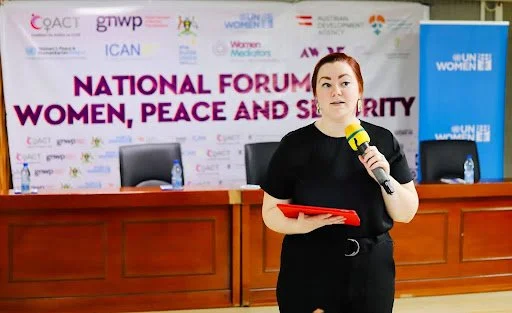Katrina Leclerc
She/her
Global Network of Women Peacebuilders; Canadian Coalition for Youth, Peace & Security
Canada
Profile
Katrina Leclerc identifies as a French-Canadian, young peacebuilder. She said she focuses on the synergy between the Youth, Peace, and Security (YPS) and the Women, Peace, and Security (WPS) agendas. She has worked in the Canadian Parliament, where she expanded her network and fostered relationships with significant policymakers. In 2014, she started as a research assistant at the Global Network for Women Peacebuilders, later became communications coordinator, and in 2022 began serving as its program director.
Katrina has advised multiple stakeholders, including Global Affairs Canada and UN Women. She consults on policymaking, focusing mostly on youth and gender. She is also the co-founder of the Canadian Coalition for Youth, Peace & Security (CCYPS), a youth-led and volunteer-run organisation that provides a network of support for youth working on areas of YPS. They focus on relationship building and strengthening young people’s roles in decision-making and civic spaces. They aim to give youth more legitimacy and bring broader perspectives into government policies. Katrina has a degree in Human Rights and Conflict Resolution studies, a master’s in Peace and Conflict Studies and is earning a PhD in a similar field.
“A lot of times what prevented me from getting involved, is that I was too intimidated to occupy certain spaces because other people who I thought were better, more knowledgeable or more important were there. And so I wish someone had given me the advice that people are just people”
Something that inspires Katrina is other young people who are very vocal, who assert themselves with a sense of agency, and who are able to have their rights respected. A lesson she has for others is to not be intimidated by authority. A lesson she has for others is to not be intimidated by authority. She said that ‘a lot of times what prevented me from getting involved, is that I was too intimidated to occupy certain spaces because other people who I thought were better, more knowledgeable or more important were there. And so I wish someone had given me the advice that people are just people.’
Katrina said that she has also learned the importance of relationships and collaboration in the peacebuilding field. As a shy person, she learned that networking does not have to happen through the conventional way of making small talk. Finding people and partnerships to collaborate with are crucial. And while there will always be people who are not willing to work collaboratively or support initiatives like hers, Katrina keeps a positive mindset. She said, ‘There will always be people if you have a good idea, and you want to run with it. There will always be people who are willing to support you.’
Published in 2025
Story
‘For me, peace is going beyond the absence of overt violence. [...] Peace is a space where individuals, no matter where they come from, have opportunities to assert their agency and live in full dignity,’ said Canadian peace builder Katrina Leclerc. She believes the exclusion of certain groups is also a type of violence. In the Canadian context, she said she sees people from marginalised groups having to face extra challenges in fully living their lives due to who they are. She thinks it is the government’s responsibility to address and lessen these barriers. Katrina is also an advocate for inclusion of youth, since she sees that the Canadian government still struggles with tokenism of young people. She said this represents another type of violence, because ‘how can you protect young people in certain spaces, if they are not present? Or are not being heard?’
As the co-founder of the Canadian Coalition for Youth, Peace & Security, she advocates for youth legitimacy and against tokenising young people. Tokenisation is an issue that Katrina personally also often faces. People expect her to speak on behalf of all young people ‒ which is an impossible thing to do because she does not have the same experiences as all the young people in Canada. One of the biggest challenges Katrina faces is finding her space as a highly educated, cis woman. She considers questions such as ‘Where is my space in this? And how do I enable space for others? And how do I make sure that my voice is not being heard over those who are part of those communities [LGBTQIA+ youth, racialised youth, youth living with disabilities]?’





